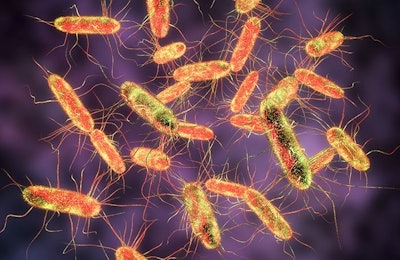
A mutated Salmonella strain caused more severe infections in layer hens, reinforcing the importance of preharvest interventions against the foodborne pathogen.
The discovery, published in the journal Scientific Reports, surprised researchers.
Previous findings in laboratory mice suggested that the deletion of the genes ttrA and pduA would reduce Salmonella’s ability to survive in the intestine.
The researchers infected laying hens and chicks of various ages with the mutated Salmonella strain and compared the immune reactions of the chicken intestinal tract and liver to birds infected with the wildtype strains of the same serotype.
“Salmonella’s genetic apparatus is sufficient to enable it to change behavior in response to not only hosts [commercial poultry] but also other bacteria that compete with it in the same environment. When these two genes were deleted, it found other survival mechanisms and became even more pathogenic to the birds,” said Mauro Saraiva, second author of the study and a postdoctoral researcher at the São Paulo State University’s School of Agricultural and Veterinary Sciences (FCAV-UNESP) in Brazil.
Preharvest intervention against Salmonella
The discovery highlights the importance of preventative measures against Salmonella that begin at hatch.
Salmonella is gram-negative anaerobic bacterium that is responsible for approximately 1.35 million illnesses, 26,500 hospitalizations and 420 deaths in the U.S. each year, according to data from the Centers for Disease Control and Prevention (CDC). Proposed framework from the U.S. Department of Agriculture (USDA) Food Safety and Inspection Service’s (FSIS) released in October 2022 puts increased emphasis on preharvest controls to reduce Salmonella in poultry.
“The Salmonella serotypes known to cause food-borne diseases don’t always make a person sick. Although there are other important routes for these bacteria to be introduced into poultry farms, the greatest danger occurs when very young chicks are exposed, as their immune system isn’t fully formed,” added Angelo Berchieri Junior, a professor at FCAV-UNES.
The study is a part of a project supported by the São Paulo Research Foundation (FAPESP).
















